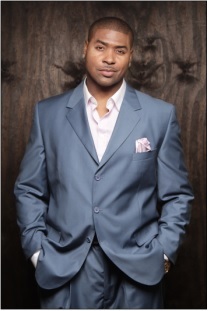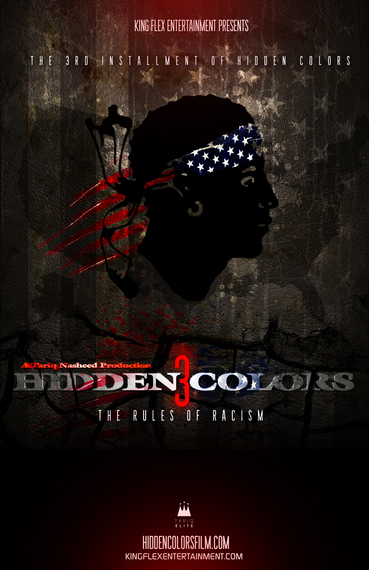Are you religious?
If you are, you are likely one of the many that believes that the end of civilization as we know it is close at hand.
Let's say for a moment that the end of the world is definitely near; here we are, this close to the end, and the difference in skin pigmentation is still an issue that paints the United States as a country that's still wet behind the ears with piss dribbling down its leg.
Last month, we celebrated the 50th anniversary of the Civil Rights Act of 1964. We celebrated this momentous occasion how?
By continuing to practice the very same acts of prejudice that we did back then, only now in a more refined fashion.
Hidden Colors 3: The Rules of Racism, directed and produced by author and documentary filmmaker Tariq Nasheed, explores racism in a way it previously hasn't been explored.
The film takes us on a journey through America, its population, and how we truly view each other and ourselves. Unfortunately, it's not through a color blind lens the way so many would have us believe.
Mr. Nasheed, also a radio personality, African-American social historian, and internet radio host, sat down with me for a conversation recently.
We discuss the current state of affairs within the black community, racism, and the proper definition of white supremacy today.
We have a black President in office. Whites voted for him and often use that as a crutch to lean on in instance where they are attempting to prove they are not racist; what is this indicative of?
The dominant society has always chosen and isolated certain single black people and showered them with praises and accolades -- as long as they were isolated. It's important for that person to be isolated, when no one else is around that person can be weaker; and because this person is isolated. When this person is isolated, they can be treated a certain away, they can get a pat on the back, and be invited into a home where a person is enabled to say, "I've just had this person in my home, I can't possibly be racist."
The thing is that systematic racism is a group phenomenon. When groups of black people start doing something together, that's when the dominant society goes on alert. How black people as a group are treated is indicative of white supremacy. This is in comparison to how one black person or a token is treated.
Here we are just over 50 years after the establishment of the Civil Rights Act, how much progress has been truly made?
To be quite honest, as the society grows in relation to the growth of society -- we really have not made any progress. Not getting beat up every day is not progress; not getting hung every day is not progress because we're still getting hung every day in the legal system. They've just updated and refined how we're getting lynched. The difference is every day citizens are not doing it, now it's our legal system. The situation where Oscar Grant was shot in the back by a BART cop, a civil suit was filed against the cop and the cop won.
Let's talk a little bit about the economic aspect of systematic racism. Elaborate for us on what's going on there.
We have economic warfare going on with black people right now. At least back in the Jim Crow era, black people had an economic base with which to protect themselves. In many cases, economically speaking, black people were better off.
How and why is that?
A lot of black people gave up their communities and their economic base in support of the idea of integration. What really should have been integrated was the finances and the tax base. A lot of black people thought that by "integrating" they would get a less severe effect of systematic white supremacy.
So, what you're saying is that integration would essentially have another meaning for the black community than it does. What is that meaning?
Integration in our society basically means that black people can spend their money with everyone else outside of the black community -- that's essentially all it means.
That would mean that the system continues to oppress the black community -- however, be it in a more politically correct fashion.
Absolutely. What's interesting to me is when people use President Barack Obama as an example -- yes, we have a black president; look at the way that he's treated. He has had more death threats than any other president combined, he's constantly marginalized, and they're constantly talking about suing and impeaching him.
You bring about a very solid point; ever since President Obama has been elected. We've seen more blatant acts of racism in the political community and with respect to people's reaction to political discussion. It isn't so much of a debate as much as it has become a finger-pointing of sorts.
Just look at people's outcry against him. People putting up signs with pictures of monkeys, Jim Crow and other racist remarks. We see that racism is still alive in America and that is truly hasn't gone anywhere. It merely became more covert because it became illegal to be overtly racist. Essentially, it had to be changed and refined and that's what Hidden Colors 3 is about, the rules of racism. A lot of people think that a white supremacist is a person walking around wearing a swastika, or a clan hood.
What is the modern definition of a white supremacist?
A white supremacist is that teacher who feels that black students are inferior; a white supremacist is that cop that passes the white drivers who are speeding, but when a black person jaywalks the cop gives them every ticket and fine in the book. It's just an everyday person walking this earth. People mistake white extremism for white supremacy -- and there's a really big difference.
I want to shift gears here just a little bit while staying within the realm of oppression. One of my biggest issues that I have is with the oppression that exists within the black community; the emergence of "#TeamDarkSkin vs. #TeamLightSkin" has become even more prevalent in recent years. I experience it myself. It seems as though we have become so accustomed to being repressed that we have to find a new way to be repressed, or to repress each other. Why do you think this is happening?
A lot of this has been picked up from the plantation days and it's been passed on culturally through the generations. Many generations will bypass it, but when we feel the effects of systematic racism, we regress back to that plantation culture and those customs. It's because we want to lash out at an oppressor, but the dominant society has a way of protecting itself. A black person will feel that need to lash out, but won't know what white person to lash out at. That is one of the many ways that systematic white supremacy protects itself.
It then becomes easy for that black person to lash out at that light skinned person in the black community; because of the fact that this black person is light skinned, they'll represent white supremacy to another black person. Sadly, that light skinned black person is just as much of a victim as a black person of a darker shade. It's important to remember that this is a group phenomenon, not an individual thing.
I always tell black people to get off of that light skin, dark skin nonsense. When that light skinned black man gets pulled over by the police, the cop doesn't let him go because he's mulatto -- he gets treated the same way.
Do you agree with the belief that we as black people are holding ourselves back?
No, I wouldn't say that -- at the end of the day, we still have to deal with systematic white supremacy. When we say that we are our own worst enemy and that we are holding ourselves back, this something that the dominant society has put out to us. We're constantly being told that we need to take responsibility and that it's our own fault.
The black community is 110 percent controlled by the dominant society, the black community is subjugated. There is nothing that we can do that cannot be undone by those in the dominant society tomorrow. For instance, if they [the dominant society] decided to build a freeway in a black neighborhood and destroy it -- they could do it easily. The black community needs to pull together, work as a team, and develop an economic base to combat the effects of systematic white supremacy.
There needs to be a greater sense of community in the black community. Instead of dividing, we need to come together.
For more from Tariq, please visit his website TariqRadio.com. Be sure to watch Hidden Colors 3: The Rules of Racism available on DVD now.
Images are courtesy of Anderson Group


